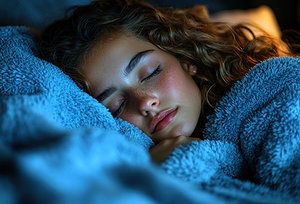Eat to Sleep: Do's & Don'ts
By Editorial Staff
The painful reality is a considerable percentage of the population doesn't get enough sleep and/or doesn't sleep well. The reasons are varied and include everything from stress to technology; distracting sleep environment to "too many reasons to stay up"; and more.
What's often overlooked / underappreciated in the sleep wellness conversation is how profoundly our eating habits can impact sleep. Let's take a look at some of the eating do's and don'ts that can determine whether you get a good night's sleep ... or just the opposite.
An extensive literature review published in the Journal of Academy of Nutrition and Dietetics examined 45 years' worth of studies (1975-2021) that focused on sleep quality and diet. Based on 20 studies that met the research criteria for inclusion in the review, three important points emerged; let's call them the do's and don'ts of eating for healthy sleep:
- Diets higher in fiber-containing complex carbohydrates (whole grains) and healthier fats (avocado, nuts, etc.)
- Diets higher in protein, particularly low-saturated-fat protein (fish, chicken, tofu, etc.).
- Diets higher in fruits and vegetables, and low in saturated fat (red meat is one of the biggies to avoid)
 Researchers evaluated "quality sleep" via various metrics including REM (rapid eye movement) sleep, deep (non-REM) sleep, how long it took to stay asleep, and frequency of waking after falling asleep. While the research doesn't necessarily establish a clear causal link between diet and sleep, it makes sense. If you want to test the findings, start by evaluating how well you sleep – and how well you eat. If you're not sleeping well, try following the dietary guidelines above and see what happens. We think you'll sleep better, feel better – and definitely be healthier!
Researchers evaluated "quality sleep" via various metrics including REM (rapid eye movement) sleep, deep (non-REM) sleep, how long it took to stay asleep, and frequency of waking after falling asleep. While the research doesn't necessarily establish a clear causal link between diet and sleep, it makes sense. If you want to test the findings, start by evaluating how well you sleep – and how well you eat. If you're not sleeping well, try following the dietary guidelines above and see what happens. We think you'll sleep better, feel better – and definitely be healthier!

